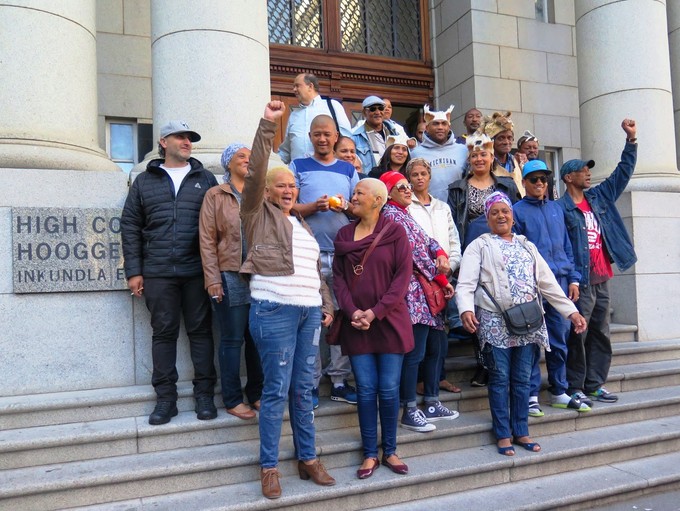
Bromwell Street residents celebrate outside the Western Cape High Court Cape Town a postponement to 4 November. Photo: Mary-Anne Gontsana
23 September 2016
An urgent application in the Western Cape High Court filed by Ndifuna Ukwazi Law Centre (NULC), acting on behalf of the Bromwell Street community, which was to be heard today, was postponed to 4 November.
Residents packed the court, but proceedings took about 10 minutes before the case was postponed.
Mandisa Shandu from the NULC said the parties involved in the case asked for a postponement in terms of an agreed timetable.
“This means that nobody will be getting evicted on Monday and things will be determined on whatever decision is taken by the judge after we’ve argued in court on 4 November,” said Shandu.
“There are 43 residents, 19 of whom are children. At this point we are asking for the eviction to be suspended pending a determination on where the people will go. We are not trying to reverse the eviction order.”
The application seeks to affirm the City of Cape Town’s obligation to Bromwell Street’s families and it consists of two parts.
In the first part of their application, the residents seek an order suspending the execution of the eviction orders against them. This part relates to the property developer, Woodstock Hub, who purchased the land.
In the second part of their application, the residents seek an order declaring, among other things, that the City has a constitutional obligation to provide them with temporary emergency housing within three months of the court order being granted.
Charnell Commando, a resident, said the postponement was a relief. “We know that we won’t be homeless by Monday. But it’s still a struggle, because we know that at the end of the day, we are going to have to argue the matter in court.”
Pierinne Leukes, spokesperson to Mayor Patricia de Lille said the City was opposing the argument that it was constitutionally obliged to provide the tenants with alternative accommodation.
“We maintain that this is private matter and we have no obligation to provide accommodation. Despite this, we proposed possible alternatives to the tenants without prejudice which they in turn rejected. Now, they are trying to shift blame to the City. “
Read previous coverage on the Bromwell case.